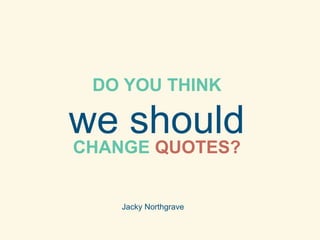Stand alone presentation
- 1. DO YOU THINK we should CHANGE QUOTES? Jacky Northgrave
- 2. MANY TIMES people will change, rearrange or even alter a quote.
- 3. THEY THINK IT MAKES THE QUOTE seem easier to understand AND BETTER FOR THE AUDIENCE.
- 4. SO RIGHT NOW, YOU’RE PROBABLY ASKING YOURSELF…
- 5. WHAT’S WRONG WITH THAT?
- 6. SOMETIMES PEOPLE MAY SPEAK DIFFERENTLY,
- 7. AND MAY BE HARD TO UNDERSTAND.
- 8. SHOULD THOSE PEOPLE BE PUNISHED FOR NOT KNOWING HOW TO speak well?
- 9. Won’t they FEEL embarrassed If you didn’t FIX their quote?
- 10. I BELIEVE we each have something to say.
- 11. OUR speech makes us WHO WE ARE.
- 12. “WE NEED TO REMEMBER THAT HOW A PERSON TALKS, Is part of their story. IT MIGHT BE THE MOST IMPORTANT PART.” -MATT CLARK, a freelance writer and medicine editor for Newsweek
- 13. WHEN QUOTING SOMEONE, we must use their words to show their message.
- 14. RALPH LANGER, Senior Vice President & Executive Editor of the Dallas Morning News said… “OUR JOB IS TO REPORT WHAT people say and think, NOT PUT WORDS IN THEIR MINDS about what they Might have said.”
- 15. BY ALTERING OR CHANGING THEM JUST A LITTLE, we could potentially be altering or changing their ideas.
- 16. MANY PEOPLE BELIEVE THAT IT MAKES NO Difference WHETHER OR NOT YOU CLEAN UP A QUOTE.
- 17. I believe it does make a DIFFERENCE.
- 18. SOME SAY JOURNALISTS QUOTE EXACTLY ONLY WHEN IT IS CONVENIENT.
- 19. WHEN WE THINK OF QUOTING IN THIS WAY, WE LOOSE SIGHT OF ITS KEY ROLE AND PURPOSE.
- 20. SO DO YOU THINK PUNCTUATION MARKS SHOULD INCLUDE every word as it was said?
- 21. “Of Course! What else are quote marks for?” -ED CRAY,
- 22. IF YOU WERE THE INDIVIDUAL WHO Was quoted and saw your words Altered or changed. . .
- 23. HOW WOULD YOU FEEL?
- 24. What if it was something you never even said?
- 25. QUOTES ARE MUCH MORE powerful WHEN THEY ARE WRITTEN THE WAY THEY WERE SPOKEN.
- 26. You shouldn’t clean up a quote JUST BECAUSE YOU THINK IT’S BETTER FOR THE PUBLIC.
- 27. WE ALL WOULD PREFER Raw and honest thoughts.
- 28. WE WANT TO KNOW exactly HOW PEOPLE ARE FEELING.
- 29. SUSAN FEENEY, Dallas Morning News National Political Reporter said, “WHEN YOU ARE PUTTING quote marks around it, YOU ARE TELLING THE READER THAT THIS IS exactly what the PERSON SAID.”
- 30. By using quotation marks correctly and not editing what is inside of them…
- 31. WE CAN DISPLAY truth again.
- 32. SO WHAT ARE YOU GOING TO DO?































